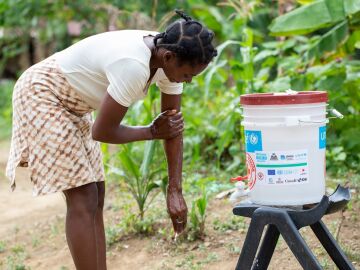
The World Health Organization (WHO) has warned of a alarming increase in cholera outbreaks in the world – mainly in eastern and southern Africa – this year and of its high mortality rate. UNICEF has also denounced that the current situation of cholera worldwide is “unprecedented” and they are “urgently” demanding 444 million euros over the next 12 months for the immediate prevention of the disease.
From January to mid-May, new cholera outbreaks have been observed in 24 countries, although more than 1 billion people in 43 countries they are in epidemic riskaccording to the WHO director for the global response to cholera, Henry Gray.
The most serious cases at present are those of Mozambique and Malawi, where cholera affected 90,000 people in the first three months of 2023, coinciding with severe flooding. Burundi, Cameroon, the Democratic Republic of Congo, Ethiopia, Kenya, Malawi, Mozambique, Somalia, Syria, Zambia and Zimbabwe are in an “acute crisis” situation.
“Us we must prepare for more and more cases“, has alerted the expert. The problems of access to drinking water Basic sanitation services are already the central cause of cholera epidemics, which worsen in cases of conflict due to the large movements of people they cause.
From the WHO they stress that the vaccine can help stop the chain of transmission, as a preventive, “but the basis of everything is to guarantee access to water and sanitation quickly. At this time, the resources to face this situation are very insufficient , as well as the production of vaccines, whose stocks are barely allowing the communities at greatest risk to be partially immunized.
Of the 18 million doses that are necessary, there are only eight million, which is why prevention campaigns in high-risk places have had to be interrupted, according to the agency’s data. In addition, the WHO has been forced to reduce the doses administered from two to one in order to protect – even if for less time – more people among those who are at greater risk of dying, such as children.
“Cholera kills fast and therefore we need to react quickly to save lives,” said UNICEF’s head of public health and emergencies, Jérôme Pfaffmann Zambruni. To this end, WHO and UNICEF have presented a joint annual response plan to the disease that will cover actions in 40 countries and for which more than 600 million dollars are required.
Source: Lasexta
Ricardo is a renowned author and journalist, known for his exceptional writing on top-news stories. He currently works as a writer at the 247 News Agency, where he is known for his ability to deliver breaking news and insightful analysis on the most pressing issues of the day.












